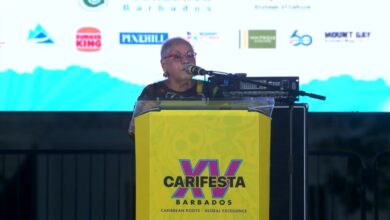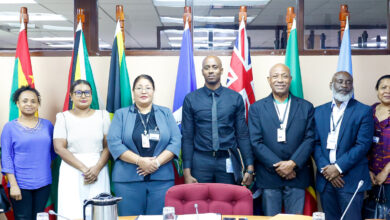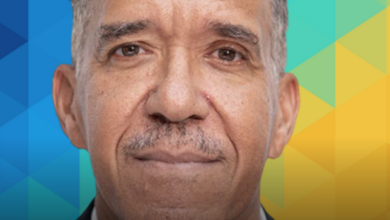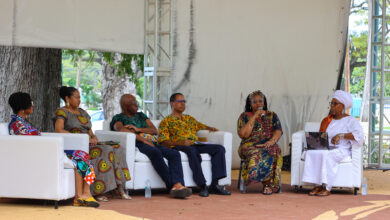|
Mr. Secretary-General In welcoming you all to this Third UK/Caribbean Forum. I say what an honour it is for Guyana to host this important event. Ever since its first meeting in The Bahamas in 1998, the UK/Caribbean Forum has proved to be a useful instrument for the consolidation and enhancement of the historically close relationship between the countries of the Caribbean and the United Kingdom. Not only does it provide us with opportunities for continuous dialogue, but it also allows us to identify practical ways and means to strengthen our partnership for development. Much has happened in the world since we met last in London two years ago. The most spectacular and shocking occurrence was undoubtedly the terrorist attack of September 11, 2001 on the United States. As the Economist magazine reported at the time, not only did the disaster indelibly alter the Manhattan skyline but it also changed profoundly the nature of international relations. All countries have been forcibly reminded of their vulnerability to unpredictable assaults on their security and the need to respond condignly to these threats. As members of the United Nations family, Caribbean states have condemned international terrorism and sought collectively to mount defences against any further attacks. These protective measures, however, have not been without significant financial costs to our economies, already tottering from the effects of September 11. Dependent as most of our countries are on tourism for their livelihood, the serious fall-off in visitors in the aftermath of the disaster resulted in a significant loss in income for the region’s hotel and travel industries. Needless to say, the impact has also been felt in the trade sector where our exports now face uncertainty not only of prices but also of ready access to markets. The flow of investment has also been reduced as a result of decreased investor confidence. Additionally, there has been an appreciable curtailment in remittances from abroad as a consequence no doubt of lost jobs for our migrant population. All this has upset our national budgets. The terrible blow of September 11 only exacerbated the difficulties which developing countries of the Caribbean already faced in an increasingly liberalised world. While the winds of globalisation have speeded more developed economies to havens of greater prosperity, they have threatened the small and vulnerable states of the Caribbean with further stagnation. As the recent Commonwealth Secretariat/World Bank study on Small States has concluded, Caribbean countries continue to be prey to hazards such as natural disasters, fluctuating export prices, income volatility, weak infrastructures and limited productivity. These disadvantages combine to circumscribe the options for development, it is also highly vulnerable and very costly. As if these ills were not enough, there are also new threats to our security, stemming from the trafficking of arms and drugs throughout the region. Concomitant with this trafficking is transboundary crime which takes a heavy toll on human lives and the scarce resources of Governments. Our countries are ill-equipped to deal with such sophisticated aggression. Deportation by metropolitan centres of hardened criminals whose connection with the Caribbean is often merely through an accident of birth, adds further to the burden of protecting our societies from harm. We therefore greatly value the assistance which the UK has offered to strengthen our law enforcement capacity and our legal system as a whole. Today the Caribbean must also contend with the deadly effects of the HIV/AIDS pandemic which has claimed so many lives already that we run the risk of losing an entire generation of our most precious resource – our youth. The number of cases in the region is the highest in the hemisphere and second only to Africa. Tragically, Governments do not have the where-withal to fight and contain the disease. Inevitably, therefore, the number of victims is likely to rise with grave socio-economic consequences. Only through increased international cooperation can we hope to halt the further spread of the disease and to be able to provide some relief to those affected by it. We very much hope that the UK will see fit to contribute to the Pan Caribbean Partnership for HIV/AIDS which was launched in the region last September as a regional response to the crisis. Honourable Ministers, Ladies and Gentlemen: If I have painted a gloomy picture of the Caribbean problematique, it is not to cast a pall on our meeting but rather to sensitise it to the urgency with which we need to consider the ways and means of cooperating to alleviate and, hopefully, eliminate these problems. Our past two encounters have served to identify and initiate cooperation in those areas where cooperation is deemed possible. The agenda for this third meeting reflects these critical problems which we must address urgently if we are to find adequate and timely solutions. We must, therefore, on this occasion, seek to quickly agree to implement those measures which are considered acceptable and feasible. Among the proposals that will arise for our consideration is one that concerns the establishment of a Caribbean Inward Investment Office to attract financial flows for the region. At a time when such flows are highly competitive and concentrated, an effort has to be made to encourage interest and investment in the Caribbean. We are now called upon to say which of the options that have been presented to us would best satisfy our requirements. On the debt issue, we should work towards making the heavy burden which we now have more sustainable. We are pleased to acknowledge that the UK’s position in development assistance generally has been enlightened and worthy of emulation by other donors. However, the needs of the Caribbean are such that much more is required if we are to come up to speed for meaningful participation in the global economy. Admittedly, trade is vital to economic growth but, as President Jagdeo said at the Coolum CHOGM, market access alone will not help small economies improve their export capability. Without assistance in the development of necessary infrastructure and other facilities, Caribbean countries cannot take advantage of trade liberalisation. As we prepare to negotiate new arrangements with the EU and the WTO, we would urge the UK side to assist us in the building of technical capacity to allow us to protect and promote our interests in the important area of trade. We have also begun to contemplate our participation in the FTAA process which we hope will go beyond special and differential treatment to the creation of a Regional Development Fund similar to that which was devised by the EU to eliminate regional disparities and provide a level playing ground for holistic development. We have a common interest in safeguarding the environment for sustainable development. Our eco-system is so fragile that we are compelled to insulate it as much as possible from disasters, whether natural or man-made. For this reason, we have sought, in collaboration with other countries of the wider Caribbean, to promote at the United Nations the concept of the Caribbean Sea as a Special Area in the context of sustainable development. We invite the UK to support this campaign. Also, in anticipation of the World Summit on Sustainable Development, which is to be held in South Africa later this year, it would be a commendable idea for us jointly to devise on an environment-related project which will not only benefit the Caribbean but also serve as a model for North-South cooperation. Last but certainly not the least in our list of the major areas of our collaboration, are education and culture. Because of a common history, language and traditions, there is ample scope for linkages between our peoples and institutions. Academic and cultural programmes which have been ongoing at all levels in all fields should be expanded . In this context, we welcome the offer of more scholarships for our young people who are the best promise of a better future for the region. They must be taught and trained not only in the traditional disciplines but also in those technical specialities that are required in this age of the dot com revolution. Mr. Secretary, Honourable Ministers, Ladies and Gentlemen: As you are aware, the long-awaited Conference on the Financing for Development was recently held in Monterrey, Mexico from March 18 to 22. While the outcome fell short of our expectations, it did appear to provide a broad consensus between developed and developing countries upon which future international cooperation could be based. Central to the consensus were the concepts of partnership and coherence which were deemed essential to the success of that cooperation. Coherence – for much too often in the past development efforts have been scattered and ad hoc, producing relatively few gains and much frustration . And of course, partnership – for without a shared vision and strategy aimed at achieving common objectives, the prospects for advancement will be limited. However, as with any other partnership – whether matrimonial, commercial or otherwise, the parties must go beyond mere words to commitment. I am pleased to note that the UK-Caribbean relationship has matured over time into a solid and structured partnership. The Report of the Ministerial Task Force, which was set up to specify the purposes of our cooperation, may be considered the articles of our association. Now that this document has the imprimatur of our Heads of Government, we must hasten to translate it into action. Our approach should be practical and realistic, recognising the constraints which exist and attempting to remove them as best we can. Bearing in mind the serious deficiency of resources, both human and financial, from which the countries of the Caribbean suffer, we would expect our partners to take account of these limitations and to help us to overcome them. Equally important is our need for support of our broad policy objectives. It will be recalled that at the meeting which several of our Heads of Government had with Prime Minister Blair at the Coolum CHOGM, President Jagdeo had highlighted the very helpful role which the UK could play as an advocate of Caribbean interests in the many international bodies of which it is a member, such as the European Union and the Group of 8. As has been evident in the former, the UK’s understanding of the special needs of the Caribbean has enabled it to serve as an effective interlocutor for the region. No doubt it can do the same within the Group of 8 – the world’s most powerful economies. We should therefore together give immediate thought to creating the “transmission”, mechanism proposed by Prime Minister Blair to allow us to communicate our concerns in advance of these important meetings, beginning with the G-8 meeting which will take place shortly in Canada. Conceivably, a small but representative group of Caribbean Heads of Government could meet with the British Prime Minister on the eve of such meetings, while the Group of Caribbean High Commissioners and Ambassadors in London might brief officials of the Foreign and Commonwealth Office on some of the Region’s concerns. It goes without saying that, in the spirit of reciprocity, the Caribbean countries would be willing, wherever possible, to take account of the UK’s perspectives in those fora in which it is not represented. Mr Secretary-of-State, Honourable Ministers, Ladies and Gentlemen: These are some of the issues which must engage our attention over the next two days. Let us make full use of the opportunity to build on our programme of cooperation so that the UK-Caribbean Partnership may be further strengthened in this new twenty-first century. |
|
Press ReleasesSpeeches





